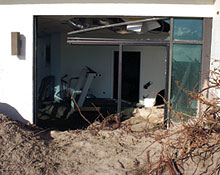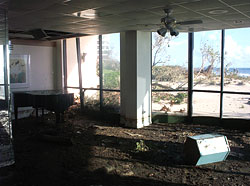
With Florida and other areas of the Southeast having been heavily buffeted already by this freakishly persistent hurricane season, HVACR contractors are facing a multitude of challenges - including those that may persist long after all the storms have gone.
In the short term, they are dealing with getting systems up and running again while making sure they protect their employees and businesses from future storms. They are trying to get the word out to customers and potential customers to have patience and be aware of fly-by-nighters seeking to capitalize on crises.
They have to focus on the days ahead when business as usual eventually returns, and they have to deal with the licensing paperwork needed to stay in business. And with all the rainfall in the area and moisture saturation, they will have to deal with potential mold situations in and around air conditioning systems.
In the midst of the turmoil, the HVACR community has pulled together to help not only their customers, but also other contractors.

Trying To Dry Out
David Staples, general manager of R.S. Andrews, Atlanta, has seen his share of work from this year's hurricane season."We've been involved in mechanical cleanup work," he said, "from motor flooding to wiring problems."
Once the storms have finally passed and power is restored, homeowners will need to deal with flooding in built-in basements and crawlspaces, and especially moisture incursion into ductwork.
He said the area has all sorts of ductwork construction - sheet metal, flex, and ductboard. In cases where ductboard has seen moisture, homeowners will need to have it torn out and replaced, or run the risk of heavy mold growth in the not-too-distant future, explained Jason Ketring, heating & cooling insulation manager for the company.
"We recommend replacing anything that can't be dried in a relatively short period of time," said Staples. "In the current state of the industry, if we have any question on the presence of mold, we recommend replacing systems.
"We already had saturated ground when Ivan came through," he continued. The additional rainfall from Jeanne, and any storms that may follow in her steps, will add to an already significant moisture load.
"We do not hold ourselves out as mold experts," Staples said. The contractor does have connections to such experts, which the company contacts with any questions on potential mold situations. "Call an expert first, get them in early," he advised.

Industry Support
While the community of Port St. Lucie and surrounding towns started cleaning up in the wake of Frances' assault on the eastern coast of Florida, a message of hope arrived from a contractor in Georgia.Robert Giancroce, president of Central Air Conditioning, Aiken, Ga., came to the aid of fellow contractor Don Miranda, Miranda's Sales & Service, by sending down crews to help Miranda's employees get back on their feet and, in turn, help customers whose electrical and A/C equipment had been damaged by the hurricane.
"Donnie was in trouble and we wanted to extend our resources to him," said Kevin Heaton, business development manager and vice president for Central Air Conditioning. Giancroce and Miranda had met about five years ago at an AirTime 500 meeting.
"It's not always about the dollar," said Heaton. "The organization has taught us to care about our fellow members, making sure that everyone is able to run a fair and profitable business. And you have to commend Donnie for the trust he exhibits towards Robert, to allow him to run his guys."

Power Makes A Difference
Repairing systems has been complicated by power outages and other hardships. High winds have toppled trees, which fell on condensing units as well as tearing roofs and siding, damaging ductwork. Heavy rains also brought widespread flooding, frequently submerging mechanical equipment or limiting access.While technicians can make a visual inspection of equipment and do some evaluations, restoration of power is needed in order to bring HVACR units back up and running, and to make a final determination if replacement is necessary. The onslaught of hurricane after hurricane has put a lot of repairs on hold.
Public utility Progress Energy Florida, for example, has been making adjustments in recent weeks to speed up response time to storm damage. "The plan includes mobilizing employees to handle increased customer calls," the utility stated, "to quickly evaluate storm damage, to coordinate line crew and equipment mobilization, to coordinate materials required for repairs, and to arrange meals and lodging for out-of-town workers.
"After severe weather, Progress Energy crews restore power by simultaneously repairing transmission lines, substations, and main distribution lines. Once the main power lines are repaired, all crews turn their attention to individual service wires."
Bracing For Weather
The barrage of storms has made persons in Florida more aware of the need to prepare as much as possible for the high winds that are part of the hurricane equation. Utilities, safety agencies, and contractors have been urging homeowners and businesses to board up and tape windows and other glass surfaces, anchor outside objects, and brace garage doors.Ken Bodwell, partner in Orlando-based Innovative Service Solutions, purchased quantities of plywood to distribute to the company's employees so they could protect their own homes.
Bodwell, who is also president of the Florida Air Conditioning Contractors of America, said he encouraged his fellow contractors to offer the same consideration to their employees as a precaution against the next wave of storms.
When evacuating or when the power goes out, Progress Energy has been urging customers to shut off gas, water, and electricity at the breaker box to prevent power surges when power is restored.

Got References?
Once a storm has passed, those seeking restoration of air conditioning and refrigeration equipment are being encouraged by ACCA Florida to "look for a reputable HVACR contractor who is knowledgeable, skilled, and qualified to do the job."Bodwell, for example, said it is proper for a person seeking assistance to ask if contractors are members of ACCA and have been certified by North American Technician Excellence (NATE), because "they have access to the latest technical information regarding HVAC systems, they learn how to make quality an integral part of their company, and, through NATE, the qualifying technicians have a core set of competencies and can be trusted by the consumers who hire them."
In general, Bodwell said those seeking a contractor should re-quest references and inquire about the contractor's credentials, since licenses and worker's compensation insurance are required in the state.
Speaking to contractors, Bodwell said, "Quality HVACR contractors, amidst the aftermath of such disasters, should continue to provide courteous and reliable service while complying with state and local codes and regulations. If parts of a system are damaged beyond repair, a quality contractor will have the skill and knowledge to choose and install proper new equipment."
Part of the aftermath process should involve a contractor making a free safety inspection, according to Service Roundtable. "The safety inspection should consist of an inspection of the line set, a check of the refrigerant charge to ensure there are no leaks from damage due to flying debris, that the power is connected and seems safe, and that there is no debris blocking any vents for gas furnaces or water heaters," the organization said.
"The idea is to make sure the system is safe to operate, not to find repair work. Note any noncritical repair need and followup later. This is a public service and good will initiative."
Assessing Damage
The problem facing HVAC contractors throughout the region is that condensing units are located outside the building envelope, making them vulnerable to high winds and damage from debris."The crews found a lot of damage not in total loss, but to outside units," confirmed Central Air Conditioning's Heaton. "There was a lot of water damage too, which raises some issues with the ductwork."
In order to assess the damage, residents have been waiting not only for power to be restored, but also for debris to be moved from their homes. After Frances passed through, it was estimated that 125,000 residents in Port St. Lucie needed debris removal, totaling 250,000 cubic yards. The estimated cost for debris removal is $6 million.
Now that Hurricane Jeanne has hit the same area, those figures are undoubtedly higher.
Even when order and electricity are finally restored, Heaton said he believes residents will hold off on most repairs. "I think most people are delaying doing any major work until the hurricane season is over," he said.
The initial crew this contractor sent down to Port St. Lucie included Giancroce and service tech Brian Hargus. Their job: to assess the situation before asking for more help from the network of Central Air Conditioning resources in Georgia.
"We've created a culture of caring here and most people have raised their hand and volunteered to help," Heaton said. "They are not receiving any extra compensation, but I think at the end of the day, they'll get much more than a pat on the back for helping a fellow contractor."
Dividing Up the Tasks
Crews were sent down early to get Miranda's employees up and running. The Miranda team of 13 to 15 members includes plumbers and electricians."The first priority was keeping the phones on - and the phones were ringing off the hook," said Heaton. "It seems that every customer was calling and we needed to get out to them, just to take a look at their equipment."
The first to receive help were those who were V.I.P. members of a monthly service plan, followed by people who called Miranda Sales & Service, and finally homeowners who were telephoned by Miranda employees.
Besides offering human resources, Central also established a secure server for Miranda's Internet operations and took incoming calls from Miranda customers.
"This is an extension of kindness," Heaton said. "There is no payment or compensation for what we are doing. It has been a real experience living through this and watching things play out."
Publication date: 10/04/2004

Report Abusive Comment